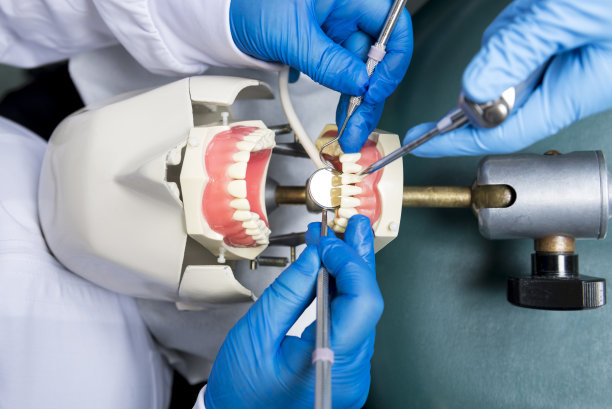Summary: Dental implant surgery can be a transformative procedure for those seeking to restore their smile and overall oral health. However, there are essential safety measures that should be considered to ensure optimal success and patient comfort. This article explores four critical aspects to contemplate before undergoing dental implant surgery: thorough preoperative evaluations, patient health assessment, choosing the right dental professional, and understanding the post-operative care. Each aspect is essential in not only enhancing the likelihood of a successful implant but also in safeguarding the patients experience. By adhering to these guidelines, patients can enjoy a smoother process and better outcomes.
1. Thorough Preoperative Evaluations Are Crucial

Before undergoing dental implant surgery, a comprehensive preoperative evaluation is essential. This evaluation often includes imaging tests like X-rays or CT scans that allow the dentist to assess the bone structure and density. Understanding these anatomical features is vital for the placement of the implant and helps in delineating a suitable treatment plan.
Additionally, these evaluations enable the dental professional to identify any underlying dental issues that may need addressing prior to the surgery, such as gum disease or cavities. By resolving these problems upfront, the practitioner can significantly reduce complications during and after the surgery, paving the way for a smoother experience for the patient.
Patients should also engage in discussions regarding their expectations and concerns. Open communication helps to establish a transparent relationship between the patient and the healthcare provider, ensuring that both parties are on the same page regarding the procedure and anticipated outcomes.
2. Assessing the Patients Health Status
A thorough assessment of the patients health status is indispensable before proceeding with dental implant surgery. Health conditions such as diabetes, heart disease, or autoimmune disorders can considerably influence surgical risks and healing processes. A detailed medical history and a discussion with a physician may be necessary to evaluate any potential implications these conditions might have on the surgery and recovery.
Moreover, factors like current medications should be thoroughly discussed, as certain drugs may interfere with the healing process or interact negatively with anesthetics. Patients should be encouraged to provide their dentist with a comprehensive list of all medications they are currently taking, including over-the-counter ones and supplements.
Finally, lifestyle factors such as smoking and alcohol consumption should also be considered, since these can adversely affect the healing of the implant site. Patients should be advised on how to modify these habits for optimal outcomes, demonstrating the importance of good health practices in conjunction with dental treatments.
3. Choosing the Right Dental Professional
Choosing a qualified and experienced dental professional is paramount for a successful dental implant surgery. Not all dentists specialize in implantology, so it is crucial for patients to seek out those who possess specific training and expertise in this area of dentistry. This includes looking for certifications and reviews from previous patients that reflect the proficiency of the provider.
The use of advanced technology and techniques is also essential. Patients should inquire if the dental practice utilizes state-of-the-art equipment and whether the professional keeps up with the latest developments in dental implant procedures. Proficiency in utilizing digital imaging, for instance, can lead to better dental implant outcomes.
Additionally, patients should feel comfortable with their dental professional and trust their judgment. Pre-surgery consultations allow patients to gauge the dentists communication style and approach to patient care. Establishing rapport will ensure a more comfortable experience and a greater likelihood of following preoperative and postoperative instructions.
4. Understanding Post-Operative Care Requirements
Post-operative care is a critical component of the dental implant journey, and patients must fully understand what it entails. Being educated about the healing process can empower patients and ease anxiety regarding their recovery. This includes information on managing pain, swelling, and any prescribed medications.
Regular follow-up appointments are essential to monitor the healing process and to address any complications or concerns. Patients should be prepared to attend these visits to ensure proper integration of the implant into the jawbone, confirming both healing and functional success.
Patient education on dietary restrictions and oral hygiene practices post-surgery also plays a crucial role. Understanding what foods to avoid and how to maintain cleanliness around the implant site will contribute to a quicker and smoother recovery. Adhering to these guidelines minimizes the risk of infection and promotes long-term success of the dental implant.
Summary:
In conclusion, preparing for dental implant surgery involves a multi-faceted approach to ensure the highest levels of safety and comfort for patients. Through thorough preoperative evaluations, careful health assessments, selecting the right dental professionals, and understanding post-operative care, patients can significantly enhance the likelihood of a successful outcome and a seamless experience. Taking these essential safety measures to heart will provide a solid foundation for restoring ones smile and confidence.
This article is compiled by Vickong Dental and the content is for reference only.
Vickong Dental
Vickong Dental is a large medical group established in Hong Kong in 2008 by professors from well-known medical universities in Guangdong and Hong Kong, as well as medical doctors from key national '985' universities (including Master's supervisors and senior professors). The chain of branches brings together expert dentists with PhDs and Master's degrees from Hong Kong and Mainland China, committed to providing high-quality dental treatment.
"Vickong Dental Practices the University Motto of 'Healing and Serving Society,' with a Stable Operation for Sixteen Years. It Has Been honored with Hong Kong Enterprise Leaders's Choice,' and is a Global Trusted Implant Center for the Nobel Implant System. Recommended by Hong Kong Metro Broadcast and Guangdong Television, it Serves Customers from Over Thirty Countries and Regions, Gaining the Trust and Favor of Citizens from the Guangdong-Hong Kong-Macau Greater Bay Area and Surrounding Cities.

Thousands of customers' unanimous praise
The most recognized and highly recommended dental service by customers in the Guangdong-Hong Kong-Macau Greater Bay Area
We Ensure You Receive Detailed Care and Attention Here
Hong Kong standards, Shenzhen prices, Your Trusted English-speaking dentists

Vickong Dental Medical-Grade Instrument Disinfection Process
Vickong Dental Medical-Grade Instrument Disinfection Process

Vickong Dental Chain: A Warm and Comfortable Environment for Treatment






Appointment Hours

Q&A
Why choose Vickong Dental?
Vickong Dental practices the university motto 「Medicine to Benefit Society」, with each branch bringing together highly qualified dentists with doctoral and master’s degrees from Hong Kong and the Mainland, and has maintained seventeen years of steady operation。Recipient of 「2024 Hong Kong Enterprise Leaders Brand」, 「2025 Hong Kong Enterprise Leaders Brand」, a Nobel Biocare Global Trusted Implant Center, and a brand recommended by Metro Radio Hong Kong and Guangdong TV。
To date, we have served customers from more than thirty countries and regions,earning exceptionally high word-of-mouth recognition and trusted recommendations from residents across the Guangdong-Hong Kong-Macao Greater Bay Area and surrounding cities
We have eight major branches in Zhuhai、Shenzhen,and a consultation and service assurance center in Hong Kong,so you can book a free consultation at any time for any questions,which is very reassuring.
If I do not accept the quotation after the CT scan, will I be charged??
No! As long as the actual treatment has not started, you will not be charged any fees.
Will there be any additional charges during the treatment process?
No, there won’t be any additional charges. Before treatment begins, we will clearly explain the treatment plan and its corresponding fees. Only after the patient agrees and signs the consent form will we proceed with the dental service.
Can I pay in Hong Kong dollars?
Yes. Vickong Dental accepts payment in Hong Kong dollars. The amount will be converted based on the exchange rate of the day, and the applicable rate will be clearly communicated to you in advance.
Can I reschedule my appointment at any time?
Yes. Please contact us via **WeChat** or **WhatsApp** as early as possible, providing your original appointment time and details, along with your preferred new date and time slot for rescheduling.













